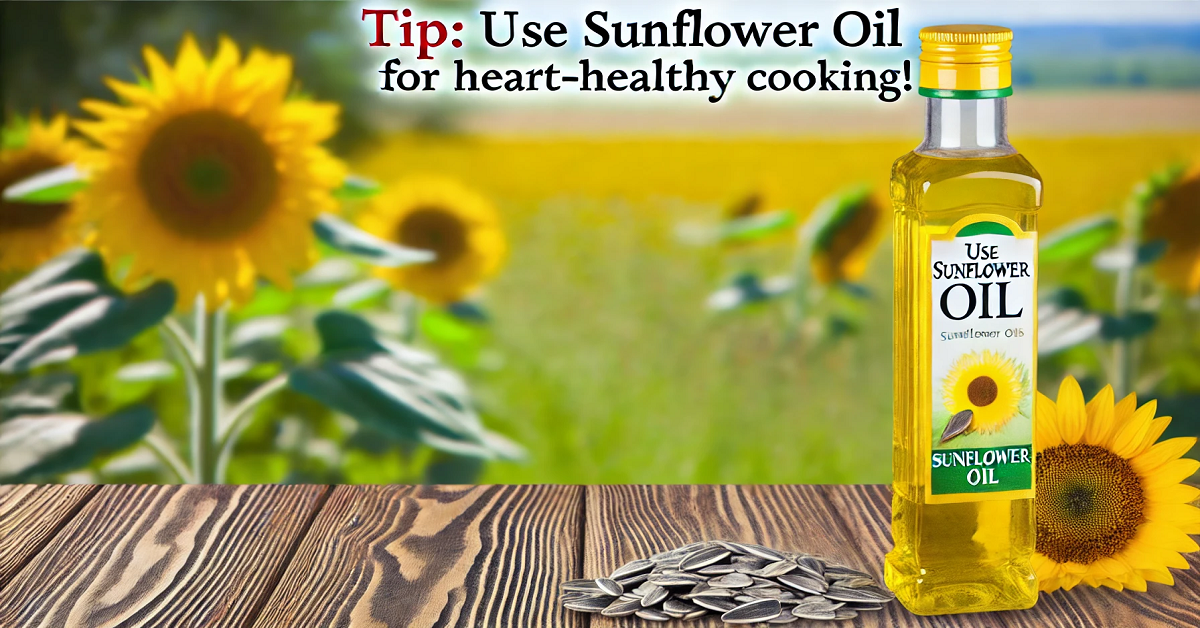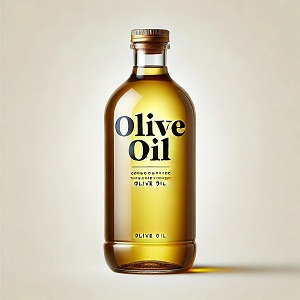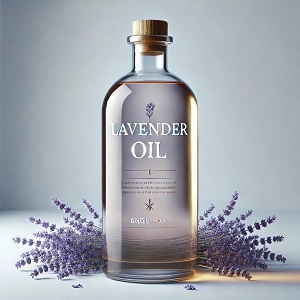
Sunflower oil is a widely available vegetable-based home cooking product with many healthful properties. It is from the seeds of the sunflower plant (Helianthus annuus). The oil has a neutral taste that does not interfere with other ingredients and works well in many foods.
Its mild flavor is compatible with many culinary uses, such as sautéing vegetables or deep-frying. Besides cooking with sunflower oil, the latter has also increased in popularity in skin care and cosmetic practices due to its moisturizing values and high vitamin content.
Table of Contents
-
-
- Introduction to Sunflower Oil
- Historical Overview of Sunflower Oil
- Types of Sunflower Oil
- Nutritional Value of Sunflower Oil
- Health Benefits of Sunflower Oil
- Skin and Hair Benefits of Sunflower Oil
- Uses of Sunflower Oil
- How Sunflower Oil is Extracted
- Comparison: Refined vs. Cold-Pressed Sunflower Oil
- Tips for Using Sunflower Oil
- Common Questions About Sunflower Oil
- Conclusion
Table of Contents for “The Liquid Gold: Sunflower Oil Benefits for Health and Beauty
Overview of Sunflower Oil
Originally from the sunflower plant, North America has been home to Sunflower oil for centuries. The Indigenous peoples of North America cultivated sunflower seeds and oil in regions where they grew for valuable food sources that would be eaten straight from a local harvest.
Russia dates back to the 19th century and one of the world’s largest producers is still today. Sunflower oil spread to Europe and gradually conquered other countries, coming solidly in first place among edible oils on the entire planet. It used to be just about crushing seeds but has grown into industrial processes that developed alongside a procurement pipeline at high quality and yields.
Sunflower oil contains abundant unsaturated fatty acids, particularly linoleic (omega-6) and oleic acids, which benefit the heart. These health benefits have made the oil popular among consumers who want to reduce their saturated fat intake.
Types of Sunflower Oil
The main types of sunflower oil are refined and unrefined (virgin, cold-pressed).
Refined Sunflower Oil
Refined sunflower oil is the most commonly used and available than any other type of (SFO). This edible oil to a refining process, including filtration, bleaching, and deodorizing.
The end product is a mussy, mild-tasting oil that has the tendency to generate less smoke and, for this purpose, can be best put taken advantage of by frying food in higher heat like baking, making it a good cooking component.
Refining can remove impurities and lengthen shelf life, but it might also remove some of the nutrients, including the naturally occurring antioxidants, that peanut oil contains in its raw state.
For example, unrefined or virgin sunflower oil contains most sunflower seeds’ natural flavor and nutrition through less refining.
Virgin sunflower oil has a nuttier flavor and darker color than refined oil. It also contains up to five times the vitamin E and other beneficial compounds. However, it has a lower smoke point and is best used in salad dressings, dips (like mayonnaise or hummus), and light cooking at low to medium heat rather than high-heat frying or grilling.
With the Above vs. Below Market Rate
The main difference between unrefined and refined sunflower oil is in processing. Industrial refined sunflower oil is neutral in taste, stably heat treated, and has a long shelf life but less nutritional value than unrefined oils. Raw Sunflower Oil, on the other hand, has a distinct flavor and keeps more of its nutritional content intact. It is less stable than high oleic sunflower oil and should for cooking at higher temperatures.
It can go either way, but it will depend on how much of a purist the inner health nut is. Refined sunflower oil is an excellent choice for the general all-purpose cook, while those wanting more flavor and nutrition in their dishes should look at unrefined types.
Sunflower oil has many health benefits, such as;
Sunflower oil’s extremely fat-rich nutritional profile offers many health benefits. High in essential fatty acids, vitamins, and antioxidants, it can positively impact health when used as part of a balanced diet. Some of the leading health benefits provided by sunflower oil are below.
-

Discover the health benefits of sunflower oil, a natural powerhouse for heart health, radiant skin, and balanced nutrition, beautifully presented with vibrant sunflowers and a sleek oil bottle. -
Heart Health
-
Sunflower oil is a well-known heart-healthy option. It contains a lot of monounsaturated and polyunsaturated fat, especially linoleic (omega-6) and oleic(acid )(omega-9).
These unsaturated fats can help lower LDL (bad cholesterol) levels, reducing the risk of cardiovascular disease and increasing HDL (good cholesterol). Research indicates that sunflower oil contains a vitamin E compound called gamma-tocopherol.
Simple dietary swaps like replacing saturated fats with unsaturated fats, such as those found in safflower oil, benefit general heart health and can prevent certain cardiovascular diseases [10]. Sunflower oil also boasts vitamin E, an antioxidant essential for heart health, as it can help protect the ticker from oxidative stress and inflammation.
Improves Cholesterol Levels
Sunflower Oil for Cholesterol:
One of the best things about this oil is that it can improve cholesterol levels. Sunflower oil is high in polyunsaturated fats, particularly the LDL-wrecking linoleic associated with heart disease. Alternatively, sunflower oil provides beneficial cholesterol and helps clear out bad cholesterol in the system. Consuming sunflower oil in moderation as a component of a good diet may help maintain healthy cholesterol levels and promote cardiovascular health.
Supports the Immune System
As a rich source of vitamin E, it also boosts the immune system. Vitamin E is a powerful antioxidant that helps protect and preserve cell membranes from damage by free radicals.
This protection is essential for a robust immune system, as free radical damage will compromise the body’s ability to defend itself and increase the risk of infections or diseases. Sunflower oil can improve immune response and maintain a healthier body by having globally well-functioning and maintained cells.
Skin and Hair Health
Sunflower oil is well known for its benefits for both skin and hair. Skin contains high levels of vitamin E, which has a nourishing and protective effect. It gives moisture to the face while adding a barrier against environmental hazards. It can enhance dry or damaged skin’s look, making it softer, smoother, and glowing. This oil is also non-comedogenic. It will not clog pores, making it an excellent option for acne-prone or sensitive skin.
Sunflower oil works as a hair conditioning agent because of its light texture and capacity to retain moisture. Not only does argan oil tame frizz, impart a healthy shine, and create an optimal environment for beautiful hair. It can help regulate sebum, promote hair growth, and reduce dandruff issues with further help from the fatty acids in this oil.
Uses of Sunflower Oil
Sunflower oil is a non-convenient product that can be used once for various reasons. Its mild flavor, high smoke point, and healthful oil properties make it a safe bet for food recipes and personal care products. There are the most common uses of sunflower oil:
-

-
In Cooking and Frying
Sunflower oil is a cooking or frying ingredient. It is excellent for frying, baking, sautéing, and grilling due to its high smoking point (especially in refined varieties!) Unlike other oils, such as coconut oil, sunflower oil has little flavor, making dishes’ original taste stand out.
Its neutral flavor makes it ideal for deep frying and drizzling directly onto delicate salads. Sunflower oil is also healthier for consumption because it has low levels of saturated fat and high unsaturated fat content, which are good reasons to use it in their cooking, along with working on improving health and reducing cholesterol.
In Beauty and Skincare
Another widespread use of this natural oil is in the beauty and skincare industry for its soothing and antioxidant effects. It is popular in other skin care creams, lotions, and cosmetic products where glycerin hydrates the skin without clogging pores. Vitamin E in sunflower oil protects skin from environmental damage like UV rays and pollution, thereby reducing the appearance of fine lines and wrinkles. It also has powerful anti-inflammatory effects that help calm irritated skin, making this ingredient ideal for someone with sensitive or dry skin.
Hair Care: Sunflower oil is the most effective oil for hair care. It also smooths frizz, adds shine, and helps the hair grow big and strong. Leave-in conditioner and hot oil treatment (conditions dry or damaged hair: softens, leaving it smooth and manageable).
Natural Product Manufacturing
Besides cooking and personal care, sunflower oil contributes heavily to producing various natural eco-friendly products. Easily absorbed and with a light texture, we recommend using it as a carrier oil in natural massage oils, soaps, or body butter. Its non-toxic, biodegradable oil in environmentally friendly tech consumer products like Novero and RunCore. Sunflower oil also appears in several natural household products, including candles and detergents with hydrogenated sunflower oil as its primary ingredient; such competitive commodity markets like energy consumption have hypothesis fraudulent.
Sunflower Oil Nutritional Value
How to Use Sunflower OilBesides the fact that it is for cooking so many things, sunflower oil is a nutritious beast. There are essential nutrients; if consumed moderately, they can also be part of a healthy diet. The following is the detailed classification of sunflower oil based on macronutrient contents:
Sunflower oil — any brand of sunflower oil, including NeoLife Sunright®) It offers no nutritional value other than high calories because it is an oil. It is high in calories, mostly from fat, providing a rapid fuel source. Sunflower oil is calorie-dense yet low in saturated fats, making it an excellent alternative to coconut or butter-containing oils.
Vitamins and Minerals
Sunflower oil contains vitamin E, one of the most potent antioxidants. Vitamin E: The recommended daily intake for vitamin E is 10 milligrams per day, and only a single tablespoon of Sunflower oil already covers that requirement. Vitamin K is vital for blood clotting and bone health; green oil is also a good source of small amounts. Sunflower oil also contains a high vitamin E level, making its most enormous nutritional contribution. It includes a limited range of minerals for multiple uses (table).
Fatty Acids
The primary fats are healthy polyunsaturated fat, linoleic acid, and oleic, more than olive oil. However, the fatty acid composition can also differ depending on the type of sunflower oil. What are the most common types? Some contain a higher % oleic acid (high-oleic or high-stearolic), while others have a much more balanced, linoleate-to-saturated profile. They are critical for healthy cell membranes, inflammatory response regulation, and cardiovascular health. High in unsaturated fats The main reason for the popularity of sunflower oil is its deficient saturated fatty acids, which are healthier.
-

From seed to bottle: Explore the journey of sunflower oil extraction, showcasing harvesting, cold pressing, mechanical extraction, and refining for a pure and natural product. -
Extraction of Sunflower Oil
Depending on the end use and quality, sunflower oil can be processed using two methods. The most prevalent techniques are industrial extraction and cold-pressing, which create different quality oil flavor styles, nutritional health benefits, and usage.
Industrial Extraction
This procedure first cleans sunflower seeds to remove dirt or debris. Then, they are ground and slightly heated to enhance the extraction rate. The seeds are then mechanically (mechanical pressing), where the oil is extracted and abrasion.
Even after the first mechanical pressing, the slurry reminds us that it always contains a certain amount of oil. Now, some chemicals like hexane are in the next phase, which removes all the oil inside the seed.
This process yields more oil than the last one and removes almost every bit of oil from each seed. It then goes through a post-extraction refining process, including bleaching, deodorizing, and filtering that purges contaminants, improving taste, color, and shelf life.
Yields a clear, neutral-flavored oil perfect for high-heat applications like frying or baking.
Industrial extraction will yield more oil, but only some antioxidants and vitamins may be used during refining. Processed oil is far more secure and has an extended service life, making it a functional choice for industrial food manufacturing and the chef.
Cold-Press (Cold Extraction)
Cold-pressed is the literary meaning of cold extraction methods, which are being dropped down now and then by new or old producers, but anyhow, it is a tradition:
In this process, sunflower seeds are stuffed with olive oil from the ground, allowing the product to be at low temperatures, usually without heat or chemicals.
The crushed seeds are then pressed, or expressed, through a hydraulic press instead of using heat to extract the oil. Cold-pressed means no heat is used during extraction, keeping more out of its natural nutrients (vitamins, antioxidants, and essential fatty acids.)
Cold-pressed sunflower oil is deemed a better-quality item because of its strong taste and superior nutrition content. Compared to the industrially refined version, this is darker in color and has a more robust nutty flavor.
Can likely find this labeled in stores as “virgin” or unrefined. It works best for low-heat cooking, salad dressings, or using raw to ensure the most benefits from consumption.AddTransientlyisasync withConfigureAwaitfalse. Due to its more stable, unprocessed form, cold-pressed sunflower oil has a shorter shelf life and may not be suitable for high-heat cooking, such as frying.
Cold-pressed oils are preferred by those who enjoy natural, raw food and healthy delicacies rich in vitamins and antioxidants. While this method produces much less oil than a large-scale significant extrusion process, cold-pressed sunflower’s high quality and body-rich taste make it desired by health-conscious consumers.
In other words, this version clearly describes both significant processes used for sunflower oil extraction: their steps and the benefits of each. If they have requested changes,
Is Sunflower oil good for cooking
While not the healthiest, sunflower oil could do much worse, as it is rich in unsaturated fats (omega six and omega nine fatty acids). Thus, this oil positively impacts heart health by lowering bad cholesterol (LDL) and is believed to increase the good one (HDL). However, as with any oil, it should be eaten in moderation and balanced within the diet.
Is there any healthy frying oil? Can you fry it with sunflower oil?
Although many oils are marketed as healthy and suitable for frying (most could not be farther from the truth), refined sunflower oil is perfect for frying: It has a high smoke point. This oil is excellent for frying, sautéing, and grilling. Meanwhile, cold-pressed sunflower oil is more suitable for mild cooking and dressing because it has a lower smoke point.
Difference Between Refined & Cold-Pressed Sunflower Oil
Sunflower oil: Sunflower seeds can extract their naturally occurring vegetable oils or obtain refined sunflowers for cooking.
Pro: For high-heat cooking (frying), Cold-pressed sunflower oil, also called virgin or cold extraction, is the most expensive and delivers more natural nutrients than heat-treated oils, but it offers a more robust nutty flavor. Cold-pressed oil is excellent for recipes involving low-heat cooking, salad dressings, or finishing oil.
Sunflower oil is good for the skin?
Well, sunflower oil is good for the skin. Vitamin E is one of the most potent skin care products on Earth. It can soothe, hydrate, and protect against free radicals from UV rays or pollutants in our air. Because sunflower oil is anti-inflammatory, it can be very gentle on the skin, making it a good option for people with sensitive or dehydrated skin. It is highly effective for Direct Application as a Natural Moisturizer in Skincare Products.
What are the side effects of sunflower oil?
Sunflower oil is low allergenic and in relatively few acute or immediate hypersensitivity cases. Nonetheless, since it is modulo well-off in omega-6 fat unsolvable, keep consuming canisters and possessors en route, no matter what fatty acid judgment, to devour those fats, which is irritating. It would be best if one were careful to balance sunflower oil with omega-3s like flaxseed or fish in the diet.
Does Sunflower Oil Help Stimulate Hair Growth?
Sunflower oil is frequently used as a natural treatment for the hair as it provides moisture and nourishment to the scalp, which could lead to better growth of healthier hair. Due to the vitamin E present in this oil, it becomes an excellent shine agent and prevents the hair from breaking as usual, so all those dry, damaged ends. Contrary to popular belief, growth oil will not make the hair grow longer and faster but, in reality, aids in contributing to the health of our scalp and, therefore, allows for healthy, long hair.
Nut-free sunflower oil: Is It Safe For Nut Allergies?
Being allergic to tree nuts and sunflowers is rare, so sunflower oil is generally considered safe. Still, it is always a good idea to check the product’s label if it has an extreme allergy to potential cross-contamination or other allergens.
How to properly store sunflower oil
Store sunflower oil in a cool, dark place out of heat and sunlight. Once neoprene, however, store it tightly sealed to help prevent oxidation so the oil does not go rancid. Cold-pressed sunflower oil also has an expiration date, so the questions and answers presented here give a comprehensive insight into some of the most frequently asked questions about sunflower oil.
So, Is Sunflower Oil Good for Frying?
Sunflower oil, the refined kind, has very high smoke points, making it a great candidate for frying. It is perfect for frying, as it has a high smoke point and does not break down into unhealthy components when heated to the high temperatures associated with deep-frying or stir-fry.
It keeps the food’s taste and texture good without releasing unhealthy compounds when oils are over their smoking point.
Sunflower oil also does not have an overwhelming flavor, which means that, like canola oil, they can use it in various dishes without worrying about whether or not the sunflowers will permeate the meal.
How Can Sunflower Seed Oil Benefit Skin?
With high levels of vitamin E and essential fatty acids, sunflower oil has beneficial properties for the skin. A deep moisturizer that softens and helps in rejuvenating the skin. Vitamin E is an antioxidant that protects the skin against environmental damage like UV light and other pollutants, which can cause our skin to age faster. Some anti-inflammatory properties can be beneficial for skin conditions like eczema and dermatitis. In addition, it is non-comedogenic and will not clog pores, making it a compatible product for many skin types, even managing those with sensitive or acne-prone tendencies.
Sunflower oil is a flexible and wonderful vegetable with health benefits. From using it in the Kitchen to cook and fry to applying it during a skincare routine for moisturizing and protecting the skin, coconut is multipurpose.
Sunflower oil is a healthful option to consider for a skin moisturizing routine. With its high levels of unsaturated fats and vitamin E, sunflower oils have properties that make them great for dietary balance and beauty regimes.
-

Sunflower oil: A natural choice for heart-healthy cooking, beautifully showcased with vibrant sunflowers and a helpful tip to inspire healthier meals. -
Tips
To Cook, choose refined sunflower oil for high-heat methods like frying, and use cold-pressed oil when making salad dressings or with low-heat dishes to keep more nutrients.
Which products to buy: However, when using sunflower oil as part of the skincare regime, ensure that the product is cold-pressed or has organic sunflower oil.
sunflower Oil Benefits And Uses Summary
Sunflower oil is a healthy, multipurpose, and high-smoke-point frying/cooking fat. It also contains essential nutrients like Vitamin E and unsaturated fatty acids, which protect the heart, reduce cholesterol levels, and strengthen immunity.Thanks to sunflower oil, the skin is hydrated and protected without clogged pores! Whether used in the kitchen or beauty routines, sunflower oil is an excellent choice to invest in better health and well-being!
Quick SummaryHigh in Vitamin E, Sunflower oil is a versatile, heart-healthy frying or cooking oil with a good smoke point. This oil has high vitamin E and unsaturated fats, which are suitable for the heart, too. It maintains cholesterol levels and the glow in the skin. Additionally, it moisturizes the skin, thus keeping the skin supple and youthful. One can use it in the Kitchen and the Beauty routine as its benefits ar


